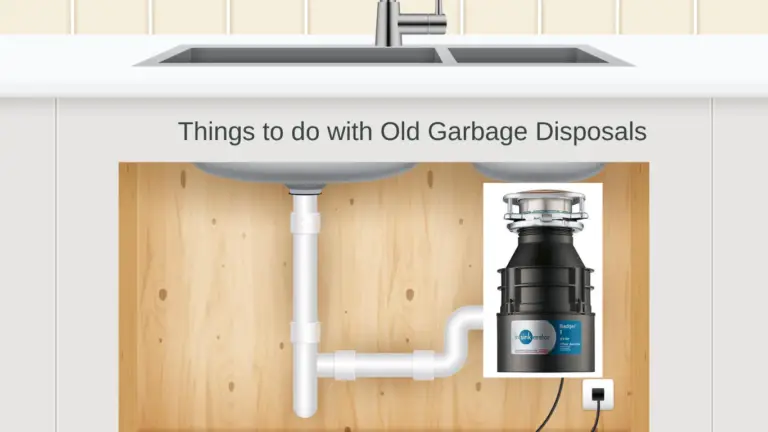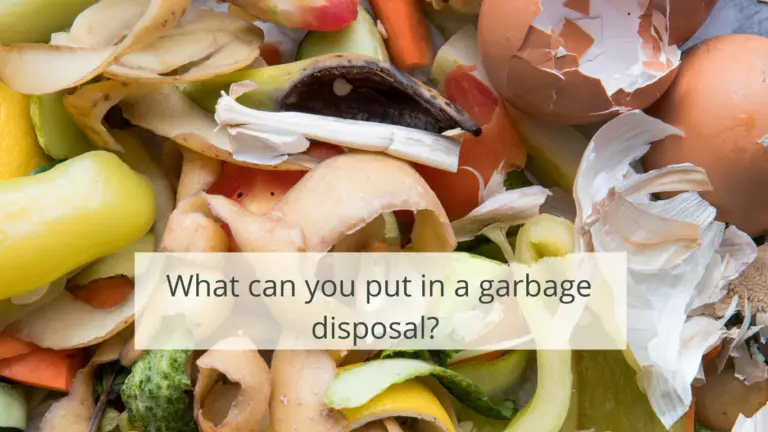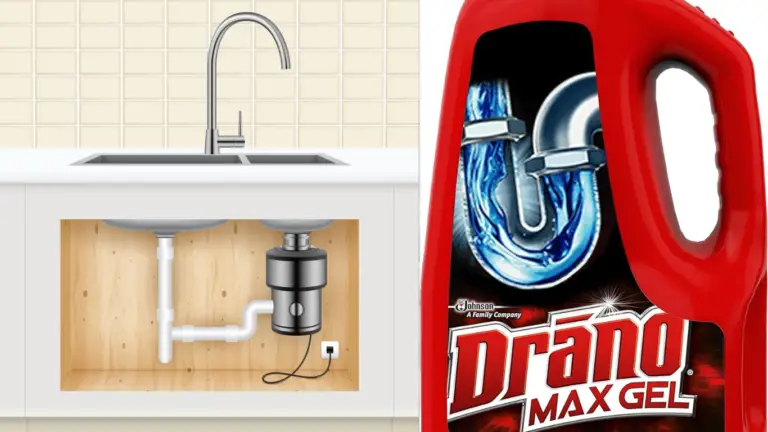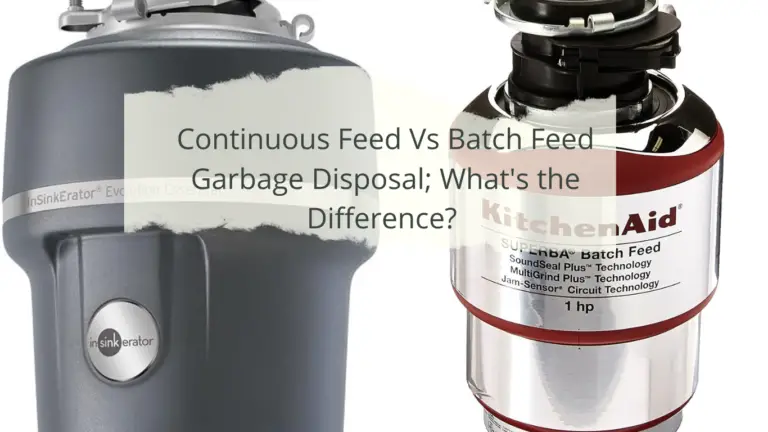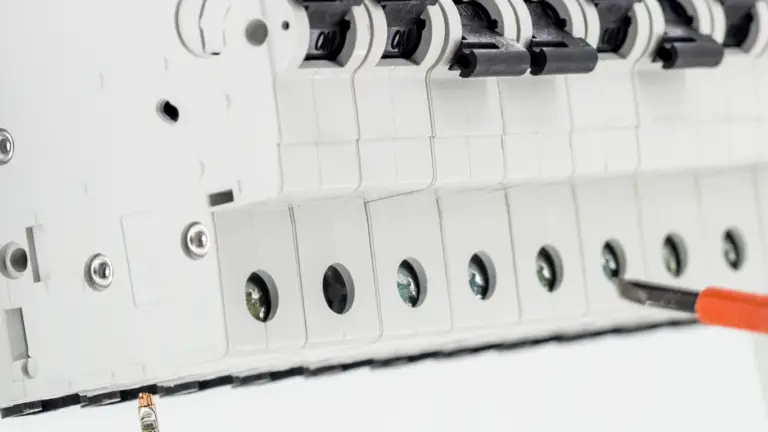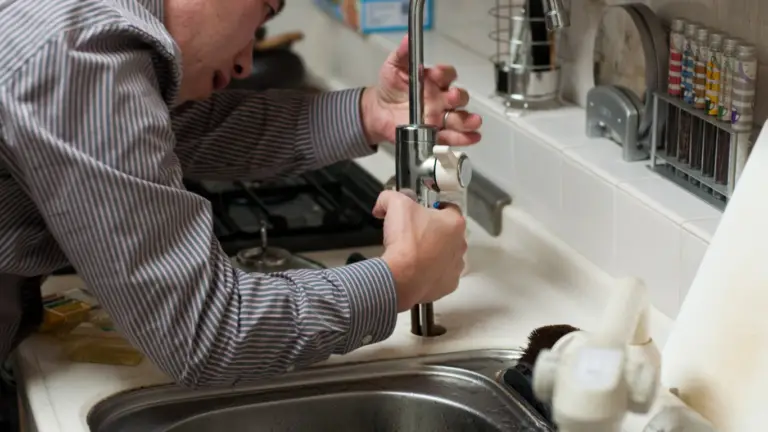How long do garbage disposals last?
This post may contain affiliate links which means I may receive a commission for purchases made through links.
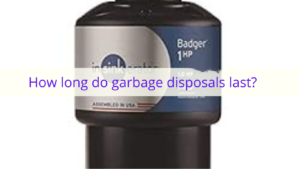
When used properly, a garbage disposal obliterates food scraps and other debris to prevent clogs and mold growth in your kitchen sink and plumbing system. However, like any other appliance, even the best garbage disposals will eventually break down.
But how do you know it is time to replace your garbage disposal unit? More importantly, how long do garbage disposals last?
This blog has 7 signs that you need to replace your garbage disposal. In addition, I’ll show you how you can maximize the life expectancy of these useful kitchen appliances.
First, let’s look at how long they last!
How long do garbage disposals last?
Most garbage disposals have an average lifespan of about 8 to 15 years. However, this will vary from one unit to another depending on various factors like maintenance, usage, and model.
For instance, if you don’t use your home’s garbage disposal frequently, it might take longer. On the other, if you use these appliances multiple times per day, they might tap out sooner. In addition, careful maintenance can extend the lifespan of the garbage disposal, while ill-advised use or chronic neglect will force you to replace the unit in just a few years.
Another notable factor that will affect your garbage disposal’s longevity is the type of food items you throw down the unit. For that, it’s important to consider what you should put and what not to put in a garbage disposal. Also, scheduling preventive maintenance and cleaning the garbage disposal regularly might help to extend its lifespan.
Factors that affect how long a garbage disposal lasts
-
What you put down the garbage disposal
As already mentioned, the items you put in a garbage disposal will significantly affect its lifespan. For instance, non-food items like plastic utensils and paper towels will damage the internal components and blades of the disposal. At the same time, they can wear out, forcing you to replace the entire unit.
Similarly, some hard food items like eggshells, bones, and uncooked pasta can dull the garbage disposal blades, reducing the unit’s efficiency. Moreover, this makes the motor work harder to get rid of these tough food scraps, causing it to wear out faster. Other food items you should NEVER put down a garbage disposal include fibrous vegetables, grease, coffee grounds, and cooking oil.
-
Quality of your garbage disposal
Modern garbage disposal models last longer compared to their older counterparts. Similarly, buying a new, heavy-duty garbage disposal will pay off in the long run as it will last longer than a cheaper option.
-
Garbage disposal usage
The more frequently you use your garbage disposal, the faster its internal components and the motor will wear out, affecting its overall lifespan. Nonetheless, it’s important to use your garbage disposal at least once every 3-4 days to prevent its components from becoming seized or corroded.
-
Installation
While an experienced DIYer can install a garbage disposal, it’s good to hire a professional plumber to ensure proper installation. This is because incorrect installation can significantly affect the lifespan of the unit. For instance, if the unit is not properly secured, it will put excessive strain on the disposal, leading to an early failure. Also, the unit can cause significant water damage if the pipes are improperly sealed.
7 Signs that your garbage disposal needs replacing
-
Poor performance
Most garbage disposals start to experience issues when they are nearing the end of their lifespan. This is mainly because of the general wear and tear of the unit’s components, affecting its efficiency and effectiveness over time. As a result, the garbage disposal will take an excessive amount of time to break down food particles. Also, the unit will start making unusual sounds when running, indicating that you need to replace your garbage disposal in the near future.
-
Unusual/ Strange Noises
Since garbage disposals have moving parts, any strange noises coming from the units can be an indicator of a serious problem. In most cases, strange garbage disposal noises are caused by foreign objects like silverware and bottle caps that have fallen down the drain.
However, if you cannot notice any foreign objects when you shine a flashlight down the garbage disposal, yet it’s producing strange noises, it could be a sign of a failing unit. In that case, the best option is to buy and install a replacement, especially if the garbage disposal is nearing the end of its lifespan.
-
Water leaks
Water leaking from the garbage disposal is another way to tell if the unit is broken. Typically, garbage disposal uses flanges, gaskets, seals, and other components to stay watertight. However, these components can become defective, develop cracks, warp, or lose adhesive properties over time.
As a result, water will start leaking from the unit, which can cause a significant amount of damage to the kitchen. For instance, leaking water can warp the cabinets, promote mold & mildew growth, rust metal components, or rot the floor.
Luckily, if the issue is caused by a loose flange, broken seal, or worn drain line, you can easily deal with the leak. After all, you only need to replace a broken/ worn seal or tighten a loose flange. However, if the water is leaking due to a crack in the body of the garbage disposal, the best option is to buy a new one.
-
Frequent clogs
If you’re using your garbage disposal correctly and only putting the right food items into the unit, you’re less likely to experience any clog issues. However, if the disposal is clogging frequently, despite putting appropriate food scraps and proper use, the unit may be nearing the end of its lifespan.
As mentioned earlier, the efficiency and effectiveness of the garbage disposal tend to decline over time. As a result, large pieces of food scraps may slip through its blades as the unit ages, causing frequent clogs.
So, if you’re constantly unclogging your garbage disposal, It’s about time you consider investing in a new unit.
-
Frequent resets
Similar to any other electrical appliance, you must plug in or hard wire a garbage disposal into your home’s electrical system to function properly. More importantly, garbage disposals have an internal circuit breaker that protects the motor from overheating and prevents any damage to the appliance in case of a short circuit. If this circuit breaker trips, you should press the reset button on the bottom of the unit to reset it.
However, if your garbage disposal keeps tripping the circuit breaker, it’s an indication that the appliance or its wiring has a problem. Either way, it’s a good idea to hire an electrician or repair professional to troubleshoot the issue. In some instances, the problem can occur because of a simple loose connection. However, if the problem is caused by a burned-out motor, the best option is to replace the entire unit.
-
Persistent odors
Garbage disposals can get pretty smelly after a while, which is not surprising considering the job they perform. However, you can easily get rid of these odors through regular cleaning and thorough rinsing.
Unfortunately, as garbage disposals get older, they become less efficient in breaking down food waste and getting rid of it fully. As a result, you’ll notice a recurring unpleasant smell coming from the unit, indicating that it can’t keep up with the demand. Therefore, you consider investing in a new garbage disposal unit.
-
Garbage disposal won’t turn on
If your garbage disposal shuts off by itself while in use or refuses to turn, check if the connected circuit has blown. Also, this could indicate that there is a serious problem with the unit itself.
Before you decide to buy another unit, press the reset button on the garbage disposal if it starts working again. Secondly, check the circuit breaker that powers the garbage disposal in your home’s electrical panel. If these troubleshooting methods do not resolve the issue, call in a repair professional to give the unit a serious look.
How to extend the lifespan of your garbage disposal
-
Grind ice cubes in the disposal once in a while
Grinding ice cubes in a garbage disposal removes any debris that may be stuck on the blades. Also, this can help you get rid of foul garbage disposal odors, especially if the ice cubes are made from lemon juice. For best results, through ice cubes in a running disposal once every week.
-
Clean the garbage disposal regularly
Following a regular cleaning and proper maintenance schedule will help you get 15 years out of your garbage disposal unit with ease. Although the blades will eventually wear down, cleaning the garbage disposal will delay its inevitable demise.
-
Run the disposal unit regularly
The internal components of garbage disposals are usually made of metal. For that reason, it’s important to run the unit regularly to prevent these components from rust buildup. So, even if you do not use your disposal unit that often, make sure you run it at least once every 2-3 days.
-
Put appropriate food scraps into the garbage disposal
Garbage disposals are not designed to handle all types of food waste in your kitchen. For instance, they cannot handle hard food items like bones. Also, you should avoid putting large quantities of food scraps into the unit as it will be too much for its blades to grind up. Instead, throw smaller pieces of appropriate food scraps down the disposal at a time to avoid clogging or overworking the unit.
Conclusion
Overall, several factors come into play when determining how long a garbage disposal unit will last. Luckily, there are various techniques you can use to extend the lifespan of your unit and ensure it works properly for a longer time. However, if you’re constantly experiencing the issues I mentioned above, perhaps it’s time to buy the best garbage disposal to replace your old unit.

